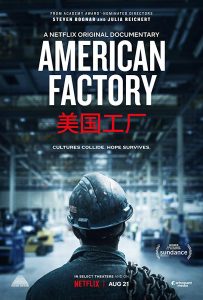
“American Factory,” by professor emeritus Julia Reichert and former motion pictures faculty member Steven Bognar, was nominated for an Oscar.
The documentary film produced by Wright State University filmmakers Julia Reichert and Steven Bognar that chronicles a Chinese company rising from the ashes of an American truck plant has been nominated for an Oscar.
“American Factory” was nominated for an Academy Award in the Documentary Feature category along with “The Cave,” “The Edge of Democracy,” “For Sama” and “Honeyland.”
“American Factory” is a look at Fuyao Glass America, a Chinese company that took over the site in suburban Moraine of General Motors’ truck plant, which closed in 2008 and put more than 1,000 workers out of jobs.
Last August, hundreds of people packed into the Victoria Theater in Dayton to see the premiere of “American Factory,” which began airing two days later on Netflix.
“This is a homegrown movie made by a homegrown team,” Bognar told the audience, adding that the movie’s credits are thick with the names of people with Wright State connections.
“American Factory” received the Best Directing Award for U.S. Documentary at the 2019 Sundance Film Festival. It was chosen by Barack and Michelle Obama as the first release by their new company, Higher Ground Productions.
Reichert and Bognar documented the final days of the same plant before it was shuttered in their 2010 HBO film “The Last Truck: Closing of a GM Plant.” “The Last Truck” was nominated for an Academy Award for Best Documentary (short subject).
Joe Deer, professor and chair of the Wright State Department of Theatre, Dance and Motion Pictures, said Reichert and Bognar have been integral to the life of the department and the university community for more than 30 years.
“They bring a level of integrity to their teaching, mentorship and documentary film work that is genuinely world-class,” said Deer. “Though their professional lives have taken them out of our classrooms, they are still powerfully part of this department and continue influencing our young filmmakers to create stories that matter.”
“American Factory” opens on a somber note, with the GM plant closing and the tears and hugs of workers who lost their jobs. It segues into the hopeful, expectant look of job seekers when Fuyao details its plans at a community meeting to launch a glassmaking operation at the site.
But “American Factory” doesn’t sugar-coat Fuyao’s foray into Dayton. The film also touches on plant safety issues, financial losses and workers’ efforts to unionize.
Videography of the factory floor sparkles. It captures robotic fists gripping plates of glass, the drip of black goo that seals the seams, showers of welding sparks and the angry red-orange of the furnace.
 The American workers express the financial trauma of losing their GM jobs and trying to survive on new, lower incomes. They talk of losing their cars and homes. One worker is forced to move in with her sister, sleeping in a tiny basement bedroom.
The American workers express the financial trauma of losing their GM jobs and trying to survive on new, lower incomes. They talk of losing their cars and homes. One worker is forced to move in with her sister, sleeping in a tiny basement bedroom.
The film also explores the lives of the Chinese workers, many of whom left their spouses and children back in China to try to make a living at Fuyao in Dayton. The cameras are with them when they discover fishing in the Great Miami River and experience the horse farm of an American co-worker.
The moviemakers also spent two weeks in China, filming a delegation of American workers visiting a Fuyao factory and headquarters. The U.S. workers are visibly impressed by the Chinese workers’ speed and efficiency as well as their devotion to Fuyao, which creates a military-like culture.
The film ends with sobering talk and visuals of worker-replacing robots, globalization and growing overseas competition.
Bognar, former Wright State professor and an alumnus, gave special thanks at the premiere to the Department of Theatre, Dance and Motion Pictures, saying it has spawned “many talented young filmmakers.”
For 28 years, Reichert was a professor of film production at Wright State. She has mentored filmmakers from around the country and is co-founder of Indie Caucus, the action group working to keep the documentary form alive and well on PBS. Reichert is a three-time Academy Award nominee, for “Union Maids” (1977), “Seeing Red” (1984) and “The Last Truck: Closing of a GM Plant” (2010). Reichert and Bognar’s film “A Lion in the House” was a four-hour, two-part primetime PBS special and won the Primetime Emmy for Exceptional Merit in Nonfiction Filmmaking as well as the Henry Hampton Award for Excellence in Film and Digital Media.

 Difficult conversations
Difficult conversations  Celebrated Wright State alum serving his community as surgeon
Celebrated Wright State alum serving his community as surgeon  Wright State University Foundation awards Students First Fund grants
Wright State University Foundation awards Students First Fund grants  Cosmic collection
Cosmic collection  Wright State revives student-faculty collaborative writing journal
Wright State revives student-faculty collaborative writing journal 